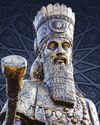Prøve GULL - Gratis
CHINA AFTER MAO
All About History UK
|Issue 131
Frank Dikötter discusses the period of economic reform and social change in the wake of the Chairman's death
-

What is the situation in China when Mao dies?
Mao died in 1976 at the end of ten years of what is generally referred to as the Cultural Revolution. This was a period of endless witch-hunts, purges and campaigns in which people proved their loyalty to Mao by denouncing friends, neighbours and even relatives. Economically, under Mao the country was a command economy, like all socialist countries at the time, but it was also an extraordinarily isolated economy. Throughout the Cultural Revolution the Chairman promoted the notion of self reliance, leaving China cut off from the rest of the world, including from what was known, at the time, as the 'socialist camp'. By the time he died the living standards of ordinary people were lower than what they had been in 1949. So by 1976 the country was confronted by two major issues. One was political, as thousands of highly placed party members were still imprisoned, under house arrest or banned from office as a result of the Cultural Revolution, including of course Deng Xiaoping. The other was economic, with a system incapable of addressing even the basic needs of the population.
Who is Mao’s successor and what is the political aftermath of the Chairman’s death?
A coup followed his death, as Mao’s wife Jiang Qing and three of her fanatical followers, a group generally referred to as the Gang of Four, were arrested. Shortly before his death, Mao had appointed Hua Guofeng, but he lacked charisma, never mind a firm grip on the levers of power. He was also extremely unwilling to re-examine the cases of the thousands of high-ranking party members who were victimised during the Cultural Revolution. The result of the pressure from those around him was the rehabilitation of Deng Xiaoping, who in December 1978 gained overall control over the machinery of the state.
Denne historien er fra Issue 131-utgaven av All About History UK.
Abonner på Magzter GOLD for å få tilgang til tusenvis av kuraterte premiumhistorier og over 9000 magasiner og aviser.
Allerede abonnent? Logg på
FLERE HISTORIER FRA All About History UK

All About History UK
73 EASTING
SOUTHEASTERN IRAQ 26-27 FEBRUARY 1991
10 mins
Issue163
All About History UK
MARIE ANTOINETTE: FASHION ICON
A new exhibition explores the enduring style of the infamous 18th-century French queen
2 mins
Issue163
All About History UK
INK! FROM THE AGE OF EMPIRE TO BLACK POWER, THE JOURNALISTS WHO TRANSFORMED BRITAIN
Bringing seven fascinating voices back into the limelight
1 mins
Issue163

All About History UK
THE HURRICANE
Does this story of unjust incarceration stick to the evidence?
1 min
Issue163

All About History UK
JANE AUSTEN'S ENGLAND
How Regency romance, society and family bonds inspired one of the nation's greatest authors
14 mins
Issue163

All About History UK
THE VALUE OF SPICES
Roger Crowley explains how spices transformed the world and why they were such a valuable commodity
4 mins
Issue163
All About History UK
EL GENERALISIMO
A new biography explores the life of Francisco Franco - the dictator who ruled Spain for 39 years
1 min
Issue163

All About History UK
Founder of the Persian Empire
How Cyrus the Great forged his kingdom using force and smart administration of his government
8 mins
Issue163

All About History UK
PORTUGUESE NAU
Portugal 14th - 16th century
2 mins
Issue163

All About History UK
LEMON SYLLABUB
ENGLAND, 16-19TH CENTURY
1 mins
Issue163
Translate
Change font size
